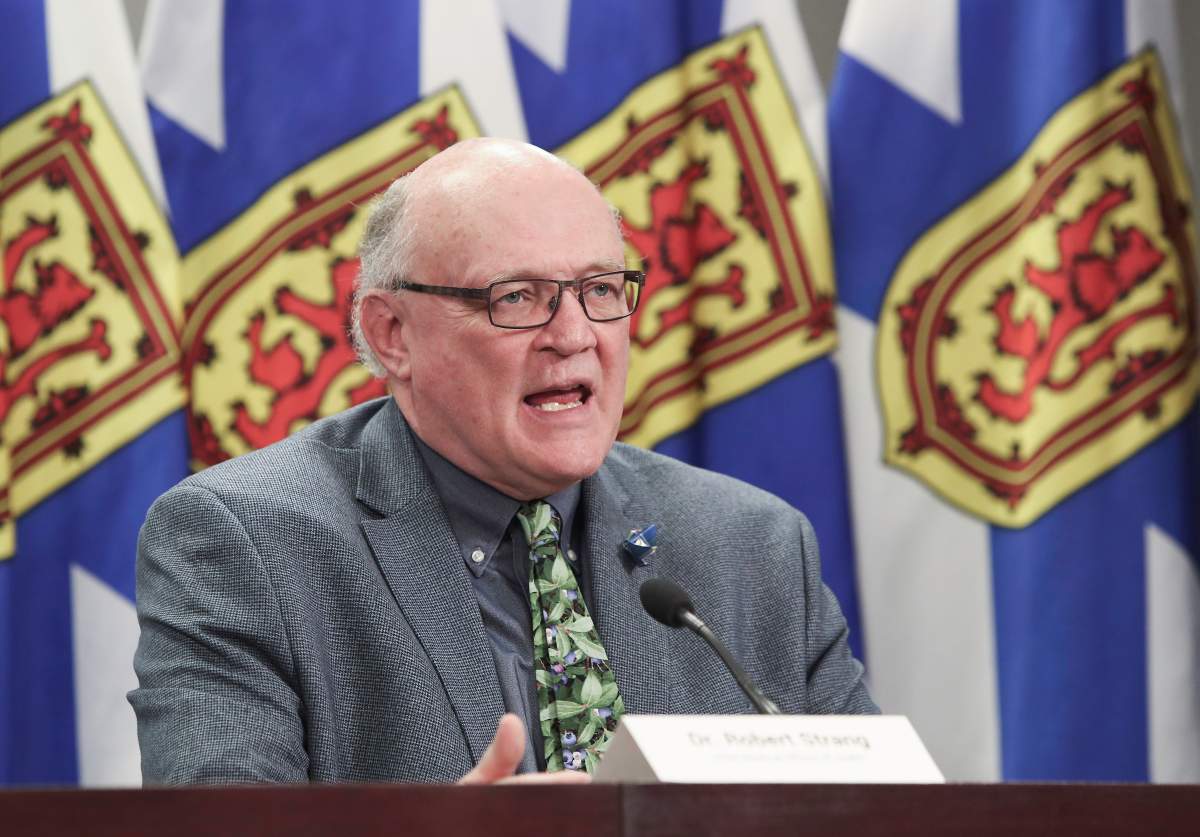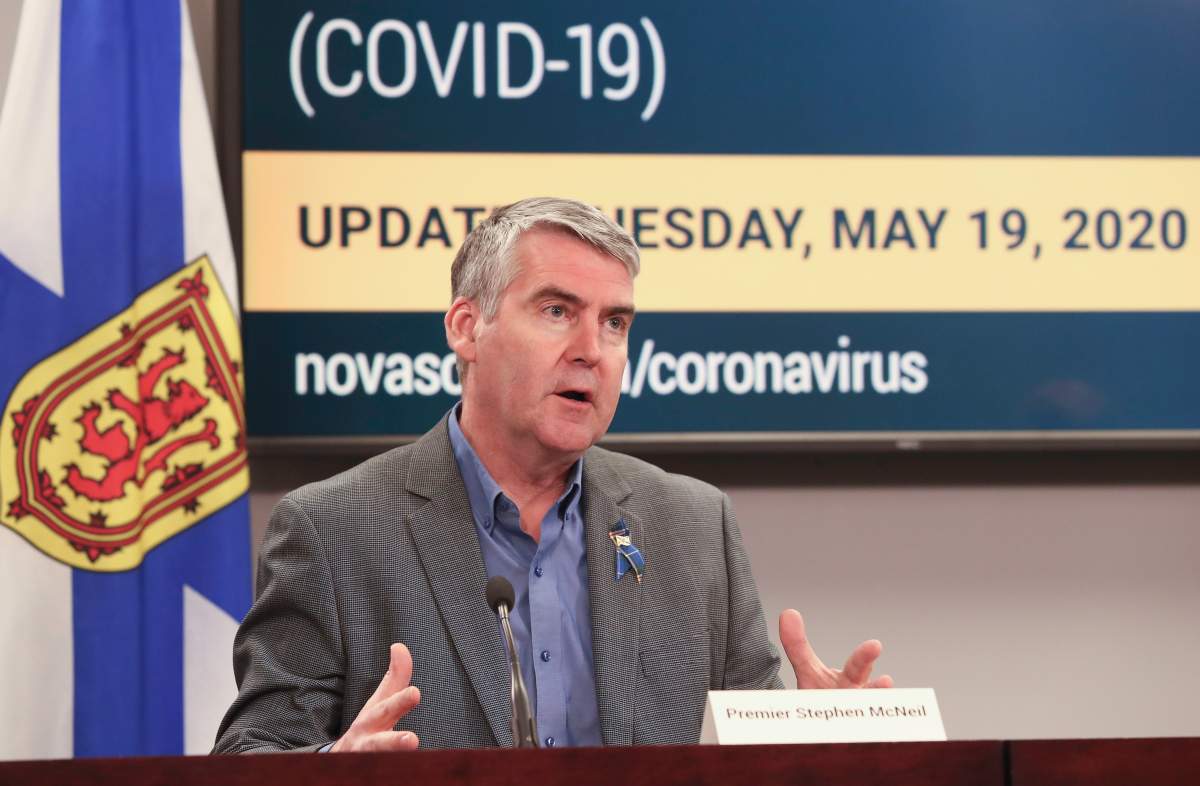Nova Scotia has experienced one new case of the novel coronavirus that’s connected to travel and another that was the result of community spread, the province’s chief medical officer of health announced Tuesday.

Speaking at an afternoon press briefing, Dr. Robert Strang said that of the 10 new cases the province was hit with over the long weekend, five were connected to Northwood Manor and three were contacts of a known case.
READ MORE: Coronavirus: Nova Scotia confirms 3 additional cases
Strang said the travel-related case came from someone involved in the occupation of transporting necessary goods across the provincial border.
“Even though our borders are restricted, we still have various types of occupations that are involved in moving goods and materials back and forth across our interprovincial — and even some of our international — borders,” said Strang.
When it comes to the community spread case, Strang says it highlights that even though case numbers have remained low in recent weeks, residents need to remain vigilant.
“We’re not completely out of the woods yet,” he said. “We need to continue with all our measures around social distancing, handwashing and pay attention to preventing COVID-19.”
1 new case, 1 new death in Nova Scotia
The province announced an additional COVID-19 case on Tuesday as well as Northwood Manor’s 50th death.
The provincial death toll has now climbed to 56 and there have been a total of 1,044 cases.
There are currently at least 32 active COVID-19 cases in Nova Scotia, 27 of which are connected to long-term care. The province says Northwood currently has 19 residents and seven staff with active cases.

One other facility has one resident with an active case.

Get weekly health news
Here is a breakdown of where cases have been identified in Nova Scotia by health zone.
- Central: 895
- Western: 54
- Northern: 44
- Eastern: 51
The QEII Health Sciences Centre’s microbiology lab completed 384 Nova Scotia tests on Victoria Day.
Confirmed cases range in age from under 10 to over 90. Nine individuals are currently in hospital, five of those in intensive care.
Clarifications on bubble families
The province introduced household bubbles on Friday, which allow two households to come together without physical distancing.
On Tuesday, Strang stressed the importance of the household bubbles being mutually exclusive to each other and clarified that your chosen bubble does not need to be a direct family member.
READ MORE: Nova Scotia introduces household bubbles as province records 4 more COVID-19 deaths
He also said it’s important to consider age, occupation and health condition when choosing a bubble family.
“Ask yourself three key questions. Is anybody in the household … at higher risk for severe disease to COVID-19?” Strang said. “Do they, through their occupation, have frequent contact with the general public?
“And the last piece is even if you decide that you’re going to get together as two households, that if any one person in those households is unwell, has symptoms that could be COVID-19, it’s critically important that the households don’t get together.”
The province also announced the easing of public health restrictions on Friday, allowing activities like archery, equestrianism, golf, paddling, sailing/boating and tennis to recommence.

Strang said even with the loosened restrictions, it’s of critical importance that proper hygiene and physical distancing be maintained.
“It’s certainly OK to have planned social gatherings with friends, with your neighbours, but you need to do that in a way that maintains social distancing, and you can have up to five people,” Strang said.
He added that outside is always better than inside for these gatherings, but handshakes, hugs and the sharing of food is still not permitted.
Reopening economy could start in ‘early June’: McNeil
Premier Stephen McNeil says Strang is working with Business Minister Geoff MacLellan to complete consultations on the best way to reopen the economy by the end of the week.
The premier says this is an important first step.
“We can’t have businesses opening without understand how to follow the public health protocols that’ll be in place,” McNeil said.
McNeil acknowledged the small businesses who have lost revenue as a result of the pandemic, saying the province is trying to balance the safety of Nova Scotians with restarting the economy.
“We want to finish the consultation, we want to follow it to make sure businesses are ready and we want everyone to be focused on what they have to do to welcome their customers back safely,” he said.
“If we get this right, we could be ready by early June.”
Questions about COVID-19? Here are some things you need to know:
Symptoms can include fever, cough and difficulty breathing — very similar to a cold or flu. Some people can develop a more severe illness. People most at risk of this include older adults and people with severe chronic medical conditions like heart, lung or kidney disease. If you develop symptoms, contact public health authorities.
To prevent the virus from spreading, experts recommend frequent handwashing and coughing into your sleeve. They also recommend minimizing contact with others, staying home as much as possible and maintaining a distance of two metres from other people if you go out.
For full COVID-19 coverage from Global News, click here.











Comments
Want to discuss? Please read our Commenting Policy first.